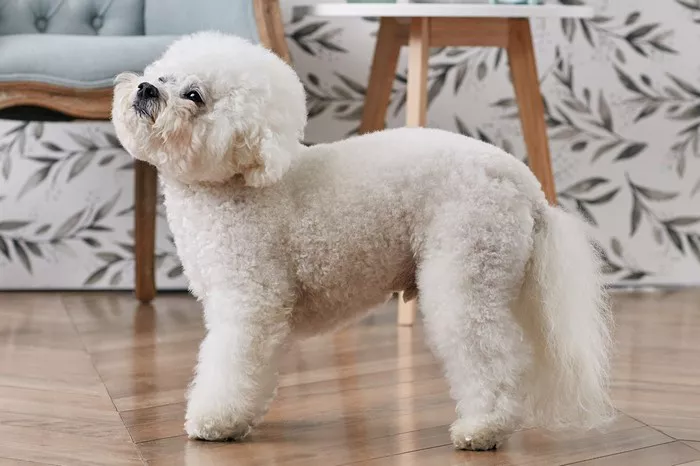The Bichon Frise is a charming and affectionate dog breed known for its fluffy white coat and playful personality. These small, cheerful dogs are often chosen for their friendly nature and their suitability as companion animals. However, while owning a Bichon Frise can be a delightful experience, it’s important to understand that no breed is without its challenges. In this article, we will explore the cons of owning a Bichon Frise, focusing on aspects such as grooming requirements, health issues, training challenges, and other considerations that potential owners should be aware of.
Grooming Needs
Frequent Grooming Required:
High Maintenance Coat: The Bichon Frise’s curly coat requires frequent grooming to maintain its appearance and health. Their hair tends to mat easily, especially if it is not brushed regularly.
Daily Brushing: To prevent tangles and mats, daily brushing is often necessary. This can be time-consuming and may require a commitment of at least 15-30 minutes each day.
Professional Grooming:
Regular Visits to Groomer: In addition to daily brushing, Bichon Frises typically need regular professional grooming. Many owners schedule grooming appointments every 4-6 weeks to keep their dog’s coat in top condition.
Cost Considerations: Professional grooming can be expensive, adding to the overall cost of maintaining a Bichon Frise.
Bathing and Drying:
Frequent Baths: The Bichon Frise’s white coat can show dirt easily, requiring regular baths. Their skin can also be sensitive, making it important to use mild, dog-specific shampoos.
Drying Process: After a bath, thorough drying is needed to prevent skin infections. This process can be labor-intensive and may require a high-quality blow dryer designed for dogs.
Health Issues
Prone to Certain Health Conditions:
Allergies: Bichon Frises are prone to allergies, which can cause skin irritation and discomfort. Common allergens include certain foods, environmental factors, and grooming products.
Dental Problems: Dental issues are also common in this breed. Bichon Frises are prone to tartar buildup and dental disease, which requires regular dental care and cleanings.
Eye Conditions: The breed is susceptible to eye problems, such as cataracts and conjunctivitis. Regular veterinary check-ups are necessary to monitor and manage these issues.
Joint and Bone Concerns:
Patellar Luxation: Bichon Frises can suffer from patellar luxation, a condition where the kneecap dislocates from its normal position. This can cause discomfort and mobility issues.
Hip Dysplasia: While less common, hip dysplasia can occur in Bichon Frises, leading to potential pain and difficulty in movement.
Life Expectancy and Medical Costs:
Longer Lifespan: Bichon Frises typically have a longer lifespan of 12-15 years. While this means many years of companionship, it also implies long-term commitment to their health and well-being.
Veterinary Costs: Managing health issues can lead to significant veterinary expenses over the dog’s lifetime, including medications, treatments, and surgeries.
Training and Behavioral Challenges
Stubbornness:
Independent Nature: Bichon Frises can exhibit a degree of stubbornness during training. Their independent nature may make them less responsive to commands compared to other breeds.
Consistency Required: Training requires consistency and patience. Owners must be prepared to invest time and effort to overcome any behavioral challenges.
Separation Anxiety:
Strong Bond with Owners: Bichon Frises are known for their strong attachment to their owners. This can lead to separation anxiety when left alone for extended periods.
Behavioral Issues: Separation anxiety can manifest as excessive barking, chewing, or other destructive behaviors. Proper training and gradual desensitization are needed to address these issues.
Socialization Needs:
Early Socialization: Bichon Frises benefit from early socialization with different people, animals, and environments. Without proper socialization, they may develop fearfulness or aggression towards unfamiliar situations.
Ongoing Socialization: Continuous exposure to varied experiences is important to ensure a well-adjusted and confident adult dog.
Space and Exercise Requirements
Space Considerations:
Small Living Spaces: Bichon Frises adapt well to apartment living due to their small size. However, they still need space to move and play.
Activity Needs: While they do not require a large yard, Bichon Frises need regular exercise to stay healthy and happy. Lack of exercise can lead to boredom and behavioral issues.
Exercise and Play:
Daily Exercise: Daily exercise is necessary to keep the Bichon Frise physically and mentally stimulated. This can include walks, playtime, and interactive toys.
Interactive Activities: Engaging activities, such as puzzle toys and games, are essential to prevent boredom and promote mental well-being.
Allergy and Health Sensitivities
Hypoallergenic Claims:
Not Completely Hypoallergenic: While Bichon Frises are often described as hypoallergenic due to their low-shedding coat, they are not entirely hypoallergenic. Some individuals with allergies may still react to them.
Allergy Management: Owners with allergies need to consider potential reactions and may need to manage their exposure carefully.
Sensitivity to Environmental Factors:
Environmental Allergies: Bichon Frises can be sensitive to environmental factors such as pollen, dust, and chemicals. This sensitivity can exacerbate allergies and skin issues.
Careful Environment Management: Creating a clean and allergen-free environment can help manage these sensitivities and improve the dog’s overall comfort.
See also: Why the Tibetan Mastiff is Banned in India
Conclusion
Owning a Bichon Frise can be a rewarding experience, filled with joy and companionship. However, prospective owners should be aware of the potential cons associated with this breed. From extensive grooming needs and health concerns to training challenges and space requirements, owning a Bichon Frise involves a commitment to their care and well-being.
Understanding these challenges can help potential owners make informed decisions and prepare for the responsibilities of caring for a Bichon Frise. With proper attention to grooming, health management, training, and exercise, the rewards of owning this affectionate and charming breed can far outweigh the difficulties.
In summary, while the Bichon Frise offers many positive attributes, including their friendly demeanor and adaptability, potential owners should carefully consider the cons outlined in this article. By being prepared for these challenges, owners can ensure a happy and healthy life for their Bichon Frise, leading to a fulfilling and enjoyable relationship with their furry companion.


